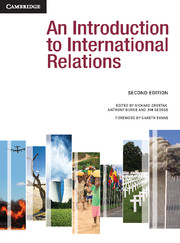Book contents
- Frontmatter
- Contents
- Tables, Figures and Boxes
- Contributors
- Preface and acknowledgements
- An Introduction to International Relations: The origins and changing agendas of a discipline
- 1 Theories of International Relations
- 1 International Relations Theory in an Age of Critical Diversity
- 2 Realism
- 3 Liberalism
- 4 Marxism and Critical Theory
- 5 Feminism
- 6 Postmodernism
- 7 Constructivism
- 8 Theories of Global Justice
- 2 The Traditional Agenda
- 3 The New Agenda
- Glossary of Terms
- Bibliography
- Index
- References
1 - International Relations Theory in an Age of Critical Diversity
from 1 - Theories of International Relations
- Frontmatter
- Contents
- Tables, Figures and Boxes
- Contributors
- Preface and acknowledgements
- An Introduction to International Relations: The origins and changing agendas of a discipline
- 1 Theories of International Relations
- 1 International Relations Theory in an Age of Critical Diversity
- 2 Realism
- 3 Liberalism
- 4 Marxism and Critical Theory
- 5 Feminism
- 6 Postmodernism
- 7 Constructivism
- 8 Theories of Global Justice
- 2 The Traditional Agenda
- 3 The New Agenda
- Glossary of Terms
- Bibliography
- Index
- References
Summary
Introduction
This chapter introduces students to the range of theoretical perspectives and issues that have animated the study of international relations down the years. First, it explains why theoretical reflection is indispensable to explaining and understanding international relations. Second, it addresses unavoidable ontological and epistemological issues in the quest for theoretical understanding. Third, it traces the growth of mainstream international relations theory. Finally, it analyses the rise of diverse critical approaches to the study of international relations.
The necessity of theory
Students in International Relations (IR) are often wary of ‘doing’ theory. Sometimes they are frightened of it, sometimes hostile to it. The reasons for these attitudes vary. Theory, it is often proclaimed, is too difficult, too abstract or irrelevant to the real world. Thankfully, these attitudes are changing as IR students become more aware of sophisticated debates about the nature and role of theory in understanding and explaining the real world they speak of and live in. These debates illustrate that theorising is not something one can choose to avoid; that in the process of giving meaning to the things, peoples, events and controversies in the world, we are engaged in a theoretical process, explicitly or otherwise.
- Type
- Chapter
- Information
- An Introduction to International Relations , pp. 22 - 34Publisher: Cambridge University PressPrint publication year: 2011
References
- 1
- Cited by



